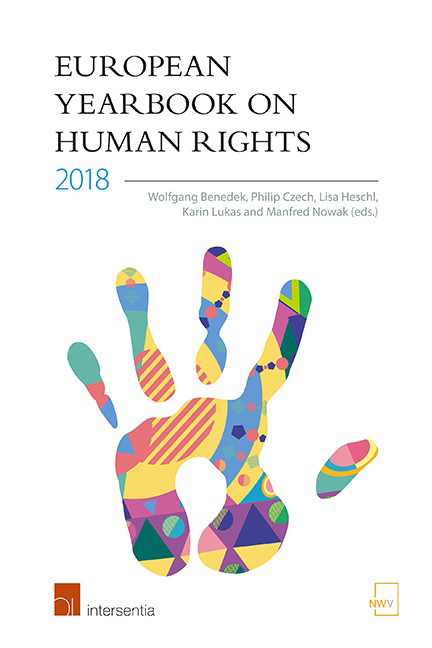Book contents
- Frontmatter
- Scientific Advisory Board
- Editors’ Preface
- Contents
- List of Abbreviations
- List of Contributors
- Part I Topic Of The Year
- Part II Eu
- Part III Coe
- The Jurisprudence of the European Court of Human Rights in 2017
- A Decade of Violations of the European Convention on Human Rights: Exploring Patterns of Repetitive Violations
- The Boundaries to Dialogue with the European Court of Human Rights
- Unprincipled Disobedience to International Decisions: A Primer from the Russian Constitutional Court
- The Impact of ECtHR and CJEU Judgments on the Rights of Asylum Seekers in the European Union: Adversaries or Allies in Asylum?
- The Human Right to Leave Any Country: A Right to be Delivered
- Some Reflections on the Principle of the Best Interests of the Child in European Expulsion Case Law
- Salafism in Europe: A Legal and Political Analysis of Human Rights and Security
- Delays in the Implementation of ECtHR Judgments: The Example of Cases Concerning Electoral Issues
- PART IV OSCE
- Part V Others
- Part VI Book Reviews
- Index
Some Reflections on the Principle of the Best Interests of the Child in European Expulsion Case Law
from Part III - Coe
Published online by Cambridge University Press: 31 January 2019
- Frontmatter
- Scientific Advisory Board
- Editors’ Preface
- Contents
- List of Abbreviations
- List of Contributors
- Part I Topic Of The Year
- Part II Eu
- Part III Coe
- The Jurisprudence of the European Court of Human Rights in 2017
- A Decade of Violations of the European Convention on Human Rights: Exploring Patterns of Repetitive Violations
- The Boundaries to Dialogue with the European Court of Human Rights
- Unprincipled Disobedience to International Decisions: A Primer from the Russian Constitutional Court
- The Impact of ECtHR and CJEU Judgments on the Rights of Asylum Seekers in the European Union: Adversaries or Allies in Asylum?
- The Human Right to Leave Any Country: A Right to be Delivered
- Some Reflections on the Principle of the Best Interests of the Child in European Expulsion Case Law
- Salafism in Europe: A Legal and Political Analysis of Human Rights and Security
- Delays in the Implementation of ECtHR Judgments: The Example of Cases Concerning Electoral Issues
- PART IV OSCE
- Part V Others
- Part VI Book Reviews
- Index
Summary
ABSTRACT
According to Article 3 of the United Nations (UN) Convention on the Rights of the Child, the child‘s best interests shall be a primary consideration in any decision concerning this child. Expulsion measures, where either the child itself or the parent of a child get expelled, are such decisions concerning children. Th is article aims to discuss how the European Court of Human Rights uses the best interests principle in its expulsion case law. It examines the case law concerning the right to family life and the prohibition of torture or inhuman or degrading treatment. Th is case law shows that in the sphere of expulsion cases the Court‘s use of this principle is inconsistent or even non-existent. It is argued that the Court should adopt a more principled approach towards the best interests principle, which implies a constant and a consistent use of this principle.
INTRODUCTION
It is not exactly ground-breaking news to state that for several years Europe has been dealing with a migration crisis. Countless pages of scholarly work from a multitude of scientific fields have been written on the issue and it was even one of the ‘ topics of the year ‘ of this yearbook two years ago. From the most recent available European Union statistics, the number of third country nationals who were returned to their home country following an order to leave increased to over 250,000 in 2016. Unfortunately, there are no official statistics on the age of these expelled persons. It stands to reasons however, that several tens of thousands of them were minors. Such an expulsion has a big psychological impact on these children and will possibly return them to a country where their mental or physical well-being is guaranteed less or perhaps even not at all.
One of the most important principles in international law 5 is the principle of the best interests of the child, enshrined in Article 3 of the UN Convention on the Rights of the Child (CRC). According to this principle, in all decisions concerning a child his or her best interests shall be a primary consideration. It can safely be assumed that a decision to expel either a child or the parent of a child is a decision concerning this child.
- Type
- Chapter
- Information
- European Yearbook on Human Rights 2018 , pp. 395 - 418Publisher: IntersentiaPrint publication year: 2018



